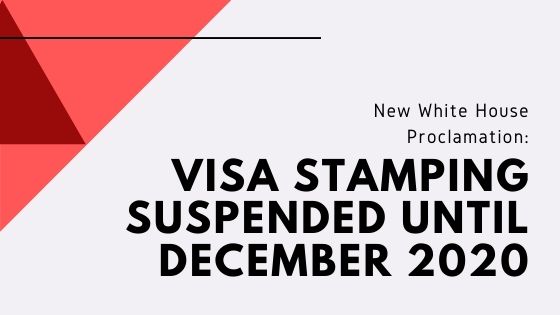On Monday, June 22, President Trump signed a proclamation that will temporarily suspend the stamping process for certain immigration types, which include the H-1B, H-2B, L-1, J-1, and other related work visas. The order, which became effective June 24, will remain in force through the end of the year and is currently set to end on December 31, 2020. However, it may be continued if need be. According to the proclamation, this ban became necessary as part of the country’s initiative towards the economic recovery process and to check the high unemployment rate caused by the coronavirus pandemic.
On April 22, 2020, there was another presidential proclamation that suspended the issuance of employment-based or Diversity Lottery visas, and certain family-based immigrant visas at U.S. consulates and embassies for 60 days. However, this new proclamation is working as an extension with more amendments to the previous one, which was scheduled to expire on June 22. It is also worth noting that routine services such as visa applications and interviews have been suspended across U.S. embassies and consulates since March 20 and will remain suspended until further notice. All of these restrictions are related to the COVID-19 pandemic.
To Whom Does the Suspension Apply?
Starting today on June 24, 2020, the entry restriction in the proclamation will apply to many temporary work visas. This means that, outside of certain conditions met through exemption waivers, the following nonimmigrant visas and their derivates will not be issued at the U.S. embassies and consulates.
- H-1B or H-2B visa
- J-1 visa for interns, camp counselors, teachers, trainees, au pair, and summer work travel participants.
- L-1A visa for managers and executive visas
- L-1B visa for specialized knowledge workers
- The ban also applies to any foreign national accompanying or following to join those individuals.
This means you may be affected if you are outside the United States and do not have a valid visa, or valid official travel document needed to travel or seek re-entry, such as a boarding foil, transportation letter, or advance parole document.
Who Is Exempted from the Ban?
The entry restriction in the proclamation exempts the following categories of foreign nationals:
- Lawful permanent residents outside the United States: If you are a lawful permanent resident, otherwise known as a green card holder and you are outside the U.S., the restriction will not prevent you from re-entering the United States. You may, however, need to obtain a transportation boarding foil.
- Spouses of U.S. citizens
- Children of U.S. citizens under the age of 21
- Prospective adopted children of U.S. citizens
- Certain special immigrants
- Foreign nationals seeking to enter the United States to provide essential services or labor to the food supply chain
- J-1 exchange program participants other than teachers, trainees, interns, camp counselors, au pairs, or summer work travel applicants.
- Foreign nationals whose purpose of entry is deemed to be in the national interest by the Secretary of Homeland Security or Secretary of States, or their respective designees.
What Determines National Interest Exemptions?
According to the proclamation, the designated U.S. officials will use their discretion to determine an alien’s qualification for an exemption. The criteria for the national interest exemption may include categories of applicants whose cases are:
- Critical to the defense, diplomacy, law enforcement, national security of the United States
- Involved with the medical care provision for people who have contracted COVID-19 and are hospitalized
- Necessary for the immediate and continued promotion of the economic recovery process in the United States
There Could Be More Restrictions in the Nearest Future
According to the proclamation, the Secretaries of Labor and of Homeland Securities have been directed to “as soon as practicable” consider presenting regulations or take action that may further affect work visas. They were asked to ensure that the presence of foreign nationals who are already in the United States or seeking to enter on EB-2 or EB-3 immigrant visas as well as H-1B nonimmigrant visas does not disadvantage U.S. workers.
While the exact actions the authorities will take based on this directive remain to be seen, there could be some more stringent regulations in the way those employment-based visas are allocated and processed.
What Does This Mean for Work Visa Nonimmigrants and Employers?
It is important to note that the proclamation does not affect foreign nationals who are already in the United States with valid work visas and it doesn’t prevent the entry of those who hold a valid work visa but are presently outside the United States.
Employers can continue to file petitions with the USCIS for status amendments, extensions, changes of employer, and changes of status for their current and prospective employees who are already in the United States on a valid nonimmigrant status.
The O-1, E-1, E-2, E-3, and TN nonimmigrant visas are also not affected by the ban, and holders of these visas may travel to and from the United States. However, it is very important for all nonimmigrant visa holders to be sure of the validity of their visas before traveling outside the United States. This is to avoid the possibility of facing challenges when trying to reenter the U.S. after their journey.
With this proclamation, employers planning to bring new H-1B cap-subject employees onboard in the future will not be able to do so while the proclamation remains in force if the beneficiaries are currently outside the United States and do not have a valid visa or approved travel document. However, if the job position falls in the categories of those included in the exemptions (healthcare, national security, food supply, etc), they may be eligible for a waiver.
Furthermore, it remains unclear how the proclamation will affect certain nonimmigrant visas such as the F-1 for students if they are in the process of switching to H-1B status. This is because they may need to leave the United States to apply for an H-1B visa stamp before being eligible to work is an H-1B status.
Is Consular Processing Available?
Yes, consular processing remains available for nonimmigrant work visas including new H-1B, H-2B, l-1, and J-1 applicants who meet the requirements for exemptions. In this case, the consular officer will use his or her discretion to determine if a foreign national is eligible for a restriction or not, based on the section (3b) of the proclamation. This means those who meet those requirements will have their visa stamped and be able to travel to the United States even while the proclamation remains in force.
VisaNation Law Group Attorneys Have You Covered
As the year goes by, we expect more light to be shed on how this proclamation will affect various employment and programs. To that end, we are monitoring the development closely and will continue to update you on the latest events surrounding the proclamation.
 Shilpa Malik
Shilpa Malik  Sabrina Saada
Sabrina Saada 